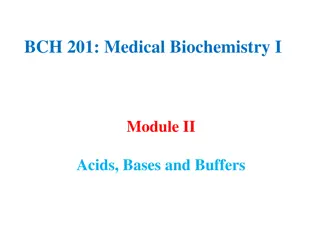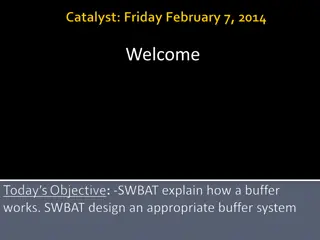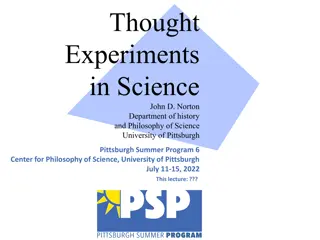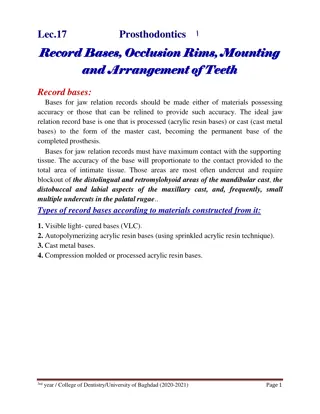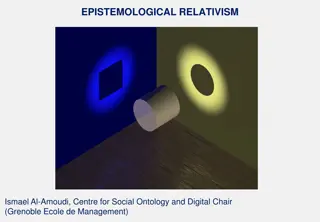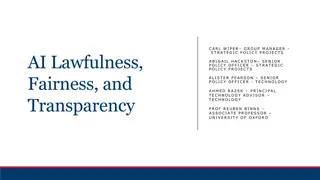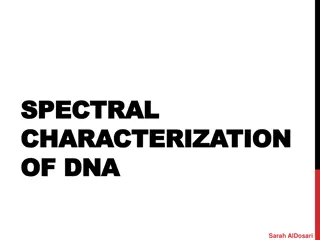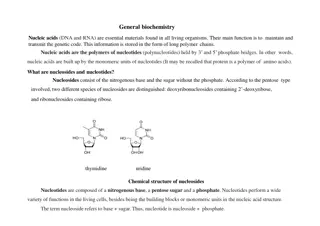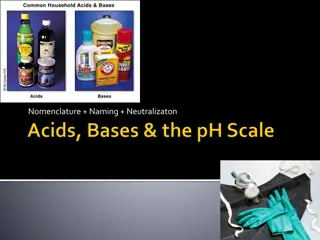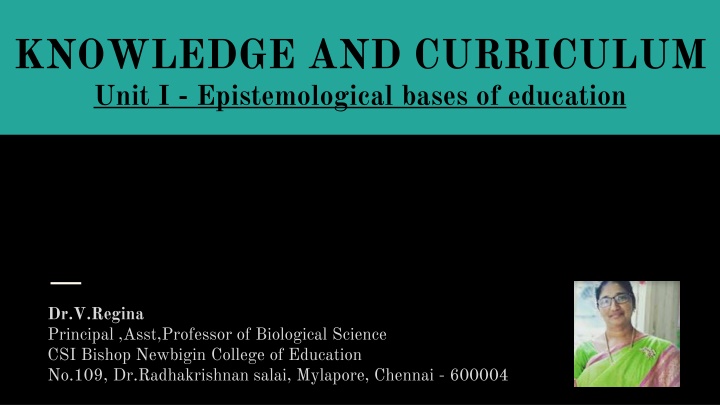
Epistemological Bases of Education: Understanding Knowledge and Curriculum
Delve into the realm of epistemology with Dr. V. Regina, exploring the origins, nature, methods, and limits of human knowledge. Gain insights into different types of knowledge, skills, teaching, and training methods, shaping your own theories of learning. Enhance problem-solving skills, critical thinking, and decision-making abilities as you navigate the complex web of information and belief systems.
Download Presentation

Please find below an Image/Link to download the presentation.
The content on the website is provided AS IS for your information and personal use only. It may not be sold, licensed, or shared on other websites without obtaining consent from the author. If you encounter any issues during the download, it is possible that the publisher has removed the file from their server.
You are allowed to download the files provided on this website for personal or commercial use, subject to the condition that they are used lawfully. All files are the property of their respective owners.
The content on the website is provided AS IS for your information and personal use only. It may not be sold, licensed, or shared on other websites without obtaining consent from the author.
E N D
Presentation Transcript
KNOWLEDGE AND CURRICULUM Unit I - Epistemological bases of education Dr.V.Regina Principal ,Asst,Professor of Biological Science CSI Bishop Newbigin College of Education No.109, Dr.Radhakrishnan salai, Mylapore, Chennai - 600004
Introduction: Epistemology Knowledge and its types Skill and its types Teaching and its types Training and its types Information and its methods of collection Reasoning and its types Belief and its types Differences - knowledge & skill Teaching and Training Knowledge and information Reasoning and Belief Conclusion Suggestive Readings Synopsis Dr. V. Regina , Principal CSI BISHOP NEWBIGIN COLLEGE OF EDUCATION
To investigate the origin, nature, methods and limits To influence our own theories Learning Objectives It influences students approaches to study and develops problem solving skill It stimulates thinking styles Learning Outcomes Dr. V. Regina , Principal CSI BISHOP NEWBIGIN COLLEGE OF EDUCATION
It is the branch of philosophy that investigates the origin, nature, methods and limits of human knowledge Our own epistemology influences our own theories of learning. Meaning of Epistemology A teacher creates new knowledge through different approach and design. It is the science of knowledge or cognition. Dr. V. Regina , Principal CSI BISHOP NEWBIGIN COLLEGE OF EDUCATION
Wisdom Acquaintance gained by facts Familiarity to a branch of learning Meaning of Knowledge Acquaintance gained by sight The fact or state of knowing Creating or involving Dr. V. Regina , Principal CSI BISHOP NEWBIGIN COLLEGE OF EDUCATION
A posteriori knowledge A priori knowledge Dispersed knowledge Domain(expert) knowledge Empirical knowledge Types of Knowledge Encoded knowledge Explicit knowledge Communicated knowledge Situated knowledge Training knowledge Dr. V. Regina , Principal CSI BISHOP NEWBIGIN COLLEGE OF EDUCATION
Meaning: The ability coming from one s knowledge,practice aptitude, ets Skill and its types Soft Skills Life Skills Time management skills Negotiation skills Critical thinking skills Self confidence skills Business etiquette skills Goal setting skill Problem solving skill Self evaluation skill Communication skill Good rapport skill Managing emotional skill Understanding of others skills Thinking skills Innovative skills Decision making skills Team work skills Stress management skills Dr. V. Regina , Principal CSI BISHOP NEWBIGIN COLLEGE OF EDUCATION
Characteristics of a Good teaching Having mastery of their teaching content Providing a safe environment Building positive relationships Teaching and its characteristics Monitoring progress and providing feedback Encouraging students responsibilities Teaching is a process of educating a person with theoretical concepts and is a kind of a knowledge transfer between a teacher and a student Having high expectation Acknowledging individual differences An ability to improvise and adapt to new demands Using valid assessment methods Dr. V. Regina , Principal CSI BISHOP NEWBIGIN COLLEGE OF EDUCATION
Induction training Job training Safety training Apprenticeship training Internship training Refresher training Training and Its types Promotional training Physical training Training is the act of increasing the knowledge and skill of an employee for doing a particular job. Computer skills training Simulation training Quality training Professional training Team training Dr. V. Regina , Principal CSI BISHOP NEWBIGIN COLLEGE OF EDUCATION
Surveys Interviews Existing data sources Literature sources Observations Information & its method of collection Documents and records Experiments Information is the knowledge communicated or received concerning a particular fact or circumstance or news. Tallies or counts Face to face/ phone Online tracking or market analytics Social media monitoring Dr. V. Regina , Principal CSI BISHOP NEWBIGIN COLLEGE OF EDUCATION
Inductive reasoning Detective reasoning Conditioned reasoning Categorical reasoning Reasoning & its types Linear reasoning Abductive reasoning Reasoning is a process of thinking ,where the individual is aware of a problem and - Identifies, evaluates and decides upon a solution. Backward reasoning Critical thinking reasoning Counterfactual thinking reasoning Intuition reasoning Dr. V. Regina , Principal CSI BISHOP NEWBIGIN COLLEGE OF EDUCATION
Belief systems Religious faiths Agnosticism Animism Atheism Belief & its types Deism Belief is a feeling of certainty that something existing , is true or is good. It is a propositional attitude which cannot be proven scientifically. Determinism Esotericism Vague belief Self-supported belief Belief beyond reasonable doubts Dr. V. Regina , Principal CSI BISHOP NEWBIGIN COLLEGE OF EDUCATION
Difference between Knowledge & Skill Theoretical or understanding of a subject Acquired through learning or experience Gained from others It increases with experience Factual and procedural information Safety rules Teachable Ability to understand and recall Training or experience of a subject Acquired through practice or learned behaviour Developed by self (practiced or learning) It increases with practice Proficient and effective use of a person s knowledge Arithmetic Teachable Ability to perform an activity with proficiency Dr. V. Regina , Principal CSI BISHOP NEWBIGIN COLLEGE OF EDUCATION
Difference between Teaching & Training Provides new knowledge Teaching fills mind Stresses on knowledge and wisdom with long times span Gives extensive domains with limited knowledge in general Needs effective reciprocal communication Is in for a broaden area Theoretically oriented Knowledgeable people to learn the tools Training shapes habits Stresses on skills and abilities with a shorter times span Gives intensive information about a limited and specific domain Needs effective physical activity of the learner Is for a specific area Practical oriented Dr. V. Regina , Principal CSI BISHOP NEWBIGIN COLLEGE OF EDUCATION
Difference between Knowledge & Information It becomes knowledge once we apply it or use it A more profound conclusion Knowledge is personal and individual Involves a personal experience Knowledge is information with meaning Actionable information Devoid of owners dependencies Data and facts that known are there A raw data collected through observation Data in numbers, words, images or sounds Images can be included Information is data with context Processed data Depends on the owner Dr. V. Regina , Principal CSI BISHOP NEWBIGIN COLLEGE OF EDUCATION
Difference between Reasoning & Belief Science (fact) Evidences/ Arguments Exercise critical reasoning based upon evidence Postulate tentative theory Religion Word of God/ words from the source Accept the faith Considered it to be the revealed truth which cannot be doubted Done Subjective Personal level Subject the theory to peer review Objective Universal level Dr. V. Regina , Principal CSI BISHOP NEWBIGIN COLLEGE OF EDUCATION
Thus education epistemological depending on , whether it is describing the origin or the knowledge. Students can reflect on the existence of minority cultures and on the necessity to use multiple learning methods to achieve understanding of the complete problems the epistemological used positions basis describe vary of to - or acquisition of a mere Conclusion Dr. V. Regina , Principal CSI BISHOP NEWBIGIN COLLEGE OF EDUCATION
Suggestive Readings Barret, Brain., etal (2018) Knowledge curriculum and equity, social realist perspectives Routledge http://www.mastek.com/careers/learning-development.html Hoffman, T., Nine Non Techie skills that hiring managers wish you had . Computer world, november 12, 2007, accessed July 26, 2010. Dr. V. Regina , Principal CSI BISHOP NEWBIGIN COLLEGE OF EDUCATION




